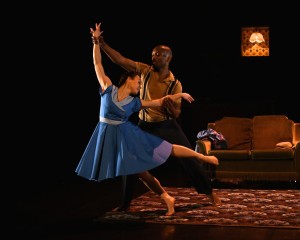Phoenix Dance Theatre’s latest arrangement celebrates the 70th anniversary of SS Empire Windrush’s arrival, bringing the first Caribbean migrants to the UK. The work is a lively celebration of the rise of multicultural Britain with an uplifting soundtrack of calypso, jazz, blues, gospel and reggae. Artistic Director Sharon Watson cultivates a concept album of personal and political stories, told in style by a diverse international cast. Three separate chapters form another masterpiece of choreography that captivates and transcends.
First up is the playful Maybe Yes Maybe, Maybe No Maybe, choreographed by Aletta Collins and featuring dancers Natalie Alleston, Carmen Vazquez-Marfil, Michael Marquez, Frances Shepherdson and Prentice Whitlow. Experimenting as if with new-found limbs and functionality, the group are pared back to simple, small black outfits against a bare black stage in which hangs a single microphone, appearing and disappearing from their reach in a spotlight that seems to give it its own sense of intention to match the mischievous nature of the bodies below it. Like a conspiracy of limbering raptors, the cast move curiously and fluidly around each other, bursting with sharp energy and impish audacity. A soundtrack of breaths, claps and clicks builds the animalistic feel so that we never know quite what to expect next in this perfect jigsaw of bodies.
The second chapter of the show is the tense and melancholy Shadows, choreographed by Christopher Bruce CBE and featuring Whitlow again, as well as Carlos J. Martinez, Sandrine Monin and Vanessa Vince-Pang. The four bring a weighty presence to a family table setting, frozen in situ like an unchangeable moment in the past before each breaks from their place in turn. Martinez enacts beautiful tantrums while Vince-Pang floats, dangerously untethered, until Whitlow and Monin act as parental reigns and draw the unit back together. There is a feeling of coming sacrifice, of each mind going through its own stages of grief and preparation for a big change that will come when it is officially morning. Attentive lighting design by Luke Haywood places the scene in the pre-dawn, the family existing outside time and society in their own universe. A classical score adds to the fraught, nurturing energy.
“Forging our hearts and minds with the resistance of ebony.”
The final, titular piece is choreographed by Watson herself and eventually features the full company; we now meet Elliott Augustine, Jasmine Gordon and Kennedy Junior Muntanga. It opens on an orange sky glow through crates aboard a ship, stormy noises washing over the auditorium. Wails fades on the waves that crash out the threat of rocks. Gradually we build from one man’s peaceful solo walk, a joyful spring in the wind, through teasing, flirting interactions to something new. Reactions ripple, carrying bodies into new spaces to tell adjacent stories. Isolationist pops almost break through the melting movement, breaking the rules of certain dance styles to create something more responsive, activist.
Composer Christella Litras’ track God Save The Dream sees Whitlow gravitated under his suitcase, maybe as protection, maybe as an anchor, a burden. The scene changes swiftly to focus on white-masked washerwomen upholding the oppressive everyday violences of domestic gatekeeping. Proudly presenting their dirty-slogan delicates, the ringleader bully lets slack enough arm’s length to try on one black body for size, taking an intimate encounter as her reluctant, charged entitlement.
Skipping the hostile whispers, we revel in a family reunion, muffled at first and then blossoming into a glorious party, expanding from the home onto the street and into the night. A pernicious white mask dances belligerently into the crowd of slow-dancing couples, solo, and cannot be tamed or even work in proximity to partners. When she finally removes her mask, she is free to wind down, see and connect. The ensemble settle into a church congregation and embrace each other before bursting into a final joyful whirl to a cover of Mary Mary’s Shackles.
The continually growing, expanding texture of the show reflects the Caribbean contribution to British culture, in a compassionate, uplifting and moving look at the ‘Windrush generation’s bitter-sweet experience. As Watson states in a post-show discussion at York Theatre Royal, there are so many and such sprawling stories to tell from Windrush that she had to make some tough decisions on which to include, and the show inspires further dedication to its history.
Catch the show at the final two ports of its tour from the 16th November. Watch the trailer and purchase tickets here.




